#survivors guide
Explore tagged Tumblr posts
Text
Media Representation and Writing Characters with Facial Differences
[Large Text: Media Representation and Writing Characters with Facial Differences]
A writing (?) guide (?) consisting of an explanation of what facial differences are, some basics about the community of people with facial differences, a terminology guide that is extremely subjective, a very long explanation of the real-life effects of misrepresentation of facial differences, a subjective guide on why most tropes surrounding facial differences are awful and unoriginal, and the part that people actually want to see (I hope at least) AKA "types of characters I do actually want to see". As always, this post is meant for people who have no experience with the subject, and not in any way an attempt to tell writers with facial differences on what to do in their own writing.
What Does "Facial Difference" Mean?
[Large Text: What Does "Facial Difference" Mean?]
"Facial Difference" (FD for short) is an umbrella term for any kind of scar, mark, or condition that makes your face visibly different. This encompasses anything from not having parts of the face or having less of them (e.g. anophthalmia, anotia, hemifacial microsomia), having "more" to the face (e.g. tumors, neurofibromatosis), conditions affecting how the face moves (e.g. facial paralysis, ptosis, cranial nerve diseases), ocular differences (e.g. hypertelorism, nystagmus, strabismus), conditions affecting the colors of the face (e.g. rosacea, vitiligo, pigmentation conditions in general), a "look" that signals a specific disability (e.g. Down Syndrome) and approximately a million more things - scars, burn marks, craniofacial conditions, ichthyosis, cancers, and a lot more.
Despite popular opinion (popular ignorance would be more accurate because no one knows about it in the first place but opinion sounds better-) people with Facial Differences have both a movement (Face Equality) and a specific word for the oppression we experience (Disfiguremisia). There is even the Face Equality Week that happens every year in May! This is a real thing that has been happening, and we are generally going unnoticed, even in the "representation matters" circles, the body positivity movement, disability spaces, and so on. There is an alliance of organizations dedicated to this called Face Equality International, who can help you learn about the real-world community and movement! They even have sections specifically about media representation, which is foreshadowing for how important this topic is to the community and for how long the "explaining the issues of representation" part of this post is.
And of course, if you have a facial difference/disfigurement, you can do whatever the hell you want when writing! Call your characters how you call yourself, subvert the tropes you want. I don't want to preach to people who already know all of this firsthand. This post is meant to explain some things to people who don't have experience with having FD.
Terminology
[Large Text: Terminology]
There is a lot of words to describe people with FD. Some of them are alright, most of them are awful.
Please keep in mind that all of these terms (maybe except for the... last one...) are used by real life people. This isn't me saying "you can't say that about yourself" (more power to you!) but rather to educate able-bodied people that some words they refer to use with aren't as neutral as they think (at least not to everyone).
"[person] with a facial difference" - generally the most polite and widely accepted way to refer to us. That's what is generally used in the Face Equality movement, sometimes alongside the next term which is...
"[person] who has a disfigurement" - an alright term that is sometimes used interchangeably with the one above. However, most things that involves the term "disfigurement" to me sound kinda medicalized and/or like lawyer speech. It's not offensive, but just generally used in more official ways etc. Has the potential to make you sound like a medical report or a legislature sometimes. lol.
"A disfigured [person]" - starting to steer into the "uhh" territory. Describing a whole person as disfigured is, to me, just plain weird. I get that some communities push for the identity first language, but this just isn't it most of the time. Could be way worse, could be slightly better.
"[person] who has a deformity" - "deformity" is such a negatively charged word that I don't understand how people (without FD) still use it thinking it's neutral. This sounds awkwardly medicalized in a "case study from the 80s" way which is definitely not a good thing.
"A deformed [person]" - pretty much the jackpot of bad terminology, the term deformed, the calling of an entire person by it, it has everything I hate about writers describing people like me. The only one that I think is even more awful is...
"Horribly/gnarly/nasty/monstrous deformity/scar/[name of the specific condition]" - again, I'm impressed by what some people think is neutral wording. If you're searching a thesaurus for synonyms of "scary" to describe your character, I think it's time to just stop writing them. This is about using ableist terminology, sure, but I just can't imagine that someone calling their character that actually will represent FD well. It shows the negative bias and attitude of the writer.
However, there is also one pretty awesome and simple way to describe them!
Say what they have specifically. Really. Assuming you know what condition your character has (which... you should) it should be very easy. "She has Treacher-Collins Syndrome." "Xyr forehead has a port wine stain on it." "They can't fully open one of their eyes." It's clear and lets your readers know what you mean. You don't always have to throw around euphemisms to describe someone not having a nose.
Tropes and Current State of Representation
[Large Text: Tropes and Current State of Representation]
If you have read basically any of my previous posts about FD then you probably know what I'm about to say in this section. Still worth a read though? I hope. Warning that this is long, but you probably expected that already.
One thing I will note at the start is that I'm aware that a lot of writers were already turned off from this post just because of the terminology section. I know that artists love describing people like me as ugly deformed monsters! It's literally a tale as old as antiquity, and that's how overdone and stale it is. Visibly disabled = ugly. I get it, I heard it a thousand times before, I hear it majority of the time someone is excited to tell me about how horrible and gross their OC's scar is. But now some guy (me) from that group is telling you to like, maybe stop calling your disgustingly deformed character that!
I want to make it very clear that FD representation in media is not treated like a real thing that's worth anyone's time, even by the most "representation is so important!" writers. I guess it's too inconvenient to unpack the amount of baggage and uncomfortable implications this would cause. It's too good of a device in writing; everyone knows that if a guy with a scar shows up that it means he's evil, the easiest way to make a villain visually interesting is to make them a burn survivor, and if you need a tragic backstory for a serial killer just give them a congenital disability that caused literally everyone in the world to treat them horribly, so of course they started killing people. It's such a good moral signifier that literally every book and tale has done - pretty is good, ugly is bad. Dichotomy is so helpful. What is less helpful in the real world is that what is considered "ugly" is generally very tightly bound to what visibly disabled people look like. Ugly Laws weren't just like, coincidentally including disabled people and disability activists aren't still forced to speak out against being put in those "Ugliest People" lists by accident. This is all to say that facial differences are considered to be "ugly" completely uncontested, and you probably have this bias too, as the vast majority of people do. The whole "the character is ugly, then they become evil, if they're evil, they become ugly"... you need to be conscious to not do that. Don't make them evil if they're visibly disabled because it will always end up being the same old trope, no matter how many weird excuses and in-universe explanations you give. I want to put it in people's heads that you are writing about a community of people who are technically visible in real life, but have no large voices that the general public would listen to when it comes to how we are seen. The general public relies on media to tell them that.
Putting people with FD in your books or your art seems to suddenly be intimidating for a lot of artists when they realize that not only is facial difference a real thing, but people who have it can see what you write or draw (and your other readers will take some things out of what you write, subconsciously). When an author is faced with the fact that maybe they are doing harm with their writing, they either: suddenly don't want to do that anymore at all, or say: "I don't care! I'm going to be very innovative and make my very evil OC be deformed!" which is kinda funny to me that people actually seem to think it's edgy and cool to repeat the most tired Hollywood tropes but that's the best we can get I guess lol...
The attitudes that people have around the topic of facial difference and the whole "media impacts reality" are very interesting to me in general. On one hand, when I tell someone that I was bullied or ostracized because of my disabilities, no one is ever surprised. On the other hand, everyone is for some reason uncomfortable when I say that this doesn't just... appear out of thin air. People are taught from childhood that facial differences and the people who have them are scary, untrustworthy, or literal monsters. Media is a major factor in that. Like, looking back at it, it makes sense that my parents told me not to stare at other kids because they would get scared. After all, I looked like a kindergarten version of the bad guy from some kid's book. Other kids were able-bodied and looked like the good guy, I was visibly disabled and looked like the bad guy. That's the lesson kids get from media on how people with visible disabilities are: evil, scary, not to be interacted with. So they avoided me because of that while I had adults telling me to not even look in their direction. Dichotomy is so helpful, right?
And this doesn't magically stop at children. When I post a self-portrait or a selfie, I usually deal with multiple grown people comparing me to sometimes an animal, usually a specific character from a movie, sometimes even making my face into a meme right away. But if people don't generally see people with facial differences on the daily, then how are there so many specific reactions and so many similar problems that we go through? If it's so rare, then how are people so quick to tell me the character I remind them the most of- Yeah, media. It's always media. It's almost funny how everything circles back to one thing.
I want you, the author, to understand the impact of misrepresentation of facial difference. If you feel uncomfortable because you have done these tropes before, good! That's a sign of growth. If you want to help instead of harm, you need to get over your (subconscious) biases for a minute and think about how a person with the same condition as your character would feel like reading about them. Maybe you are even currently realizing that that one OC with scars is just five harmful tropes glued together. Maybe you are going to reblog this and tell me in the tags that somehow your character decided to be like that, as if they have free will instead of being written by a biased human being. Or, as I said earlier, a lot of people will be annoyed by this post and keep doing their thing. Which is like... whatever, I guess ?? There are a dozen huge movies and TV shows every year that do this. It's so basic and normalized that whatever reach this post will have will change very little. I have been signaled "we don't care what you think about how we portray people like you" my entire life, I'm frankly more surprised when people do actually claim to care. You can, practically speaking, do whatever because the FD community is fully ignored by uh, everyone, and even if I'm disappointed or annoyed I'm just one man and I know (from experience) that most people won't have my back on this topic. It's too ingrained in our culture at this point to challenge it, I suppose. I mean, there have been multiple media campaigns telling writers to treat us as people, and they had practically zero impact on the writing community. But even with my absurdly pessimistic view on this subject, I still decided to write all this. Sure, there are no signs of the industry changing and the writing community doesn't seem to care much, but I still naively hope that maybe the right person will read this and at some point in the future I will be watching or reading about a character that looks like me and actually have a good time, and even more naively that maybe people will gain some amount of awareness of the damage that has been and still is happening to people with FD through media, so that the next time they see that the villain has facial scars for no reason they will think "damn, this sucks" the same way I do. And very, very naively, I hope that people who read this will start seeing us as people. Not villains, not plot devices, not monsters.
Sad part over(?), now the fun(?) part. AKA the tropes! Yay.
"Dramatic Reveal of The Deformity".
Use of the word "deformity" very much on purpose here. This is arguably the most common trope when it comes to FD, and it's always awful. At the very best it links FD with trauma and talks in a Very Sad Voice about how having a FD is the worst thing imaginable, I guess (think a "X did this to me... now I'm Deformed For Life..." type of scene) and at worst it does the classic revealing that the main villain actually was a burn survivor under his mask, because of course he was. In media, people with FD are evil. If they're not, then it's because someone very evil did it to them (the most evil thing of all - causing someone to have a facial difference. the horror!). It can't be a thing unrelated to someone's morality, there's gotta be evil somewhere around it. There is literally nothing good about this trope. Showing FD as something to hide? Check. Dramatizing FD? Check. Placing the way someone's face looks as the worst thing possible? Check. General treating FD as some kind of circus attraction to stare at with your mouth open? Check!
"Wearing a Mask*."
I made a whole post about this one actually, that's how much it annoys me. Putting your character with FD in a mask is so overdone, lazy, and boring I'm not even offended as much as I thought I would. It's like... really? Again? For the millionth time, the character with FD is forced to hide their disability? Is the author scared..? What is the point of giving your character a visible difference if all you're doing is hiding it? And yes, I know that your character chose to do that for reasons that you as a writer somehow can't control. It's always so strange how it's the character that's in control and the writer is in the passenger seat when it comes to annoying tropes.
Found yourself already waist-deep into this trope? Take a look at this post I made.
*"mask" here refers to anything that covers the character's facial difference (e.g. eye covering, surgical mask, whatever. It's about hiding it and not a technical definition of "what is a mask").
"Good Guy has the Tiniest Scar You Can Imagine, but Don't Worry! The Villain is Deformed As Hell."
A genre on its own. In the rare instance that a positive character has a facial difference, they have a curiously limited choice - you can have:
the thinnest, definitely-very-realistic straight line going through the eye (the eye is always either perfectly okay or milky for reasons the author couldn't tell you),
the same exact line but going horizontally across the nose,
and if you're feeling spicy you can put it around the mouth,
regardless of location, just make sure it doesn't look like an actual scar (certainly not a keloid or hypertrophic one) and is instead a straight line done with a red or white crayon. Interestingly, villains have unlocked more options which stem from scars, craniofacial conditions, burn marks, cleft lips, ptosis, colobomas, anisocoria, tumors, facial paralysis, to pretty much everything that's not infantilized, like Down Syndrome. These are always either realistic or extremely bloody. I sound like a broken record by now, but no, your morality has nothing to do with your physical appearance and being evil doesn't make a visible disability get more visible. Shocker. And don't get me started on...
"The Villain turned Evil Because They Have Scars."
Ah, how nice. Disabled people are evil because they're disabled, truly a timeless classic for able-bodied writers whose worst fear in life is being disabled. In case that needs to be said, having a facial difference doesn't turn you evil, doesn't make you become a serial killer, doesn't make you violent, doesn't turn you into an assassin with a tragic backstory seeking revenge for ruining their life. If anything, having a FD makes it more likely for other people to be violent towards you. Speaking from experience.
"The Villain Just Has Scars."
An impressive attempt at cutting out the middleman of "clumsily and definitely not ableist-icly explaining why getting a scar made them evil" and not even bothering with a tragic backstory or anything. They are evil, so of course they have a facial difference. What were you thinking?
"Facial Difference is a Plot Point."
As anyone who's read like A Book will tell you, the only way to get a facial difference is to be in a very dramatic fight or an extremely tragic accident who will become a plot point and thus the facial difference is now Heavily Emotionally Charged and a symbol of The Event/The Tragedy. If you look at media, congenital FD isn't a thing, illness-related FD doesn't exist and boring domestic accident or a fall causing FD has never been seen. It has to be dramatic and tragic or else there's no point in them having it. A true "why are they [minority]" moment, if you will.
"Character gets a FD but then Gets Magically Cured Because They're Good."
Truly one of the tropes that make me want to rip my hair out. Curing your character with FD sucks just as much as curing a disabled or neurodivergent character. Who is this even for? That's not how real life works. This is some actual Bible shit, that's how old this trope is. The only thing you're doing here is making people think that those who do have FD just aren't "good enough". Every time I see it, I wonder what the author would think of the congenital disorder I have. According to this kind of in-universe rules, was I born evil and just never got good? or ??
"Character with FD has Self-Esteem Issues and Hates Their Face."
I admittedly mocked all the previous tropes because they're absurd, ridiculous, offensive, boring, all of the above, and have zero basis in reality. This one however... ouch, right in my own tragic backstory. This is unfortunately a very real experience that a lot of people with FD go through. I even have a hunch there wouldn't be as many if the general public didn't think of us as monsters, but I digress. Yes, a lot of us have or had self-esteem problems, and a lot of us wished that we wouldn't have to go through all the BS we were put through because of it. Thankfully for you, you don't have to write about it! Seriously. You don't need to. As one million people have said before me, "maybe don't write about things you haven't experienced" and I agree here. I have yet to see an able-bodied author get anything about this right. Instead of the deeply personal, complex experience that involves both you, everything around you and the very perception of what others think of you that this is, somehow writers keep giving the tired "character crying and sobbing because they're "ugly" now", because the author thinks we're ugly. Or maybe they're sad because all the other characters with facial differences are evil, and they didn't have the time to prepare their evil monologue for when they inevitably become evil in the sequel? Who knows.
"The Author Doesn't Know."
I'm not sure if a trope can be the lack of something like this, but the author not knowing what their character actually has going on medically is common to a ridiculous extent - this applies to all kinds of disabled characters as well. You don't need to name-drop the Latin term for whatever your character has, but you need know what it is behind the scenes. You need to know the symptoms. You need to know the onset and the treatment or lack of it. Please do your medical research.
Things I Want to See More of in Characters with Facial Differences
[Large Text: Things I Want to See More of in Characters with Facial Differences]
The thing you might have noticed is that I want Facial Differences and People with Facial Differences to be presented as normal. Not killers, not SCP anomaly whatever, not monsters. I'm aware that the term is tired, but I absolutely want Facial Differences normalized as much as possible.
I want to see more characters with facial differences...
who have friends that don't bully or make fun of them because of their appearance.
who have support from their family.
who know other people with facial differences - even if they're just background characters, or mentioned in passing. Marginalized people tend to gravitate towards each other, people with FD aren't an exception to this.
who are queer.
who aren't only skinny white cis dudes in general.
who are disabled in other ways! A lot of us are Blind, Deaf, both, unable to speak, intellectually disabled, having issues with mobility, and a million other comorbidities.
who are fantastical in some way - preferably not the "secretly a monster" way. But a mermaid with CdLS or an elf with neurofibromatosis? That's cool as hell.
who are allowed to be cute or fashionable.
who have jobs that aren't "stereotypical bad evil guy jobs". Give me a retail worker with a cleft lip or a chef with Down Syndrome!
who are reoccurring characters that just happen to have a FD.
who are those stock/generic characters that aren't typically associated with FD. Hero's mom has septicemia scars? Cool! The popular cheerleader at school has alopecia? Awesome! The bartender of the place the heroes secretly meet up at has Möbius Syndrome? Goes hard! The kid that the MC used to hang out with before they moved somewhere else has Crouzon Syndrome? Great!
who have their FD be visible.
who aren't ashamed of their FD.
who are feeling very neutral about their face.
who are proud of how they look.
who got their FD in a very boring way or were just born with it (and maybe make up very silly, obviously not real ways of how it happened when annoying people ask them. Think "oh, I was fighting a shark").
who have facial differences other than small scars.
who's angst is fully unrelated to their FD. I love me an angsty teen character! Even more if they are angsty about their crush, or basically anything that's not their disability.
who have a significant other who doesn't do the whole "I love you despite your looks" thing. It just kinda sucks. Sorry. I would hate if someone said this to me.
who are children and aren't implied to be "cursed" or "demonic".
in genres that aren't just horror or thriller. RomCom or slice of life, anyone?
who aren't evil.
I want to see stories with multiple characters with facial differences. I have nerve damage and facial asymmetry, and I am friends or mutuals with people with Williams Syndrome, Bell's palsy, Down Syndrome, neurofibromatosis, facial atrophy, ptosis... and a lot of other things. Your character would have (or, would probably want) some connection to their community. We aren't rare!
And, I want stories with the whole spectrum of facial differences shown. Of course you can't represent the whole spectrum, but you can still aim for at least a few. Don't give every single character with FD the same scar-through-eye + eyepatch combo. It's not unrealistic to have a range in your writing. Here is a list of facial differences you might want to check out for inspiration. Don't be scared to give them something rare - no matter how uncommon, people still have it. My specific condition is allegedly extremely rare - I still want representation!
Closing Remarks
[Large Text: Closing Remarks]
Facial difference and the media is a topic that plagued me for the past almost two decades and won't stop ever, I think. It's a very unique relationship of a group of people who just aren't allowed to get into the industry and an industry that clearly hates them, loves to use their image, and defines how people see them all at once. There's this almost overrepresentation that is consistently awful and damaging to an absurd degree. Most people know more villains with FD than actual people. Certainly doesn't feel great to be one of the aforementioned actual peoples. But I hope that this will change - the negative portrayals that are plaguing the FD community will slowly fade out and a newer wave of portrayals will come in, hopefully this time realizing that we are real people and care about us a bit more.
The thing with facial difference is that it's pretty much impossible to make a specific guide of what it's like and what to do in context of writing because it's an incredible vast category that includes conditions that are very different from each other. That's why this post was more focused on "why you should care in the first place" (sorry for the clickbait) rather than being a straightforward guide that would still be very lacking even if 20 different people were collaborating on it. I really, really encourage everyone who got through this rather long post to do their research on what they plan to write about, be conscious of their own biases, don't pull inspiration from movies because they're all hellholes full of tropes and just sit down for a minute, think of the real-world people with facial differences, and read what we have to say. I know that drawing a guy with a line across his eye is more fun than realizing you're low-key scared of or uncomfortable around the real-world equivalent, but sometimes you have to get over yourself and try to be a better person. Caring about the people you write about is, dare I say, essential. That will certainly make your writing of us better :-) (smiley face with a nose)
If you have any specific questions, feel free to send an ask
Mod Sasza
#mod sasza#face difference#writing advice#writing ref#writeblr#writing disabled characters#long post#writing reference#writing resources#writing guide#writing resource#writing tips#writing help#burn survivor representation
1K notes
·
View notes
Photo
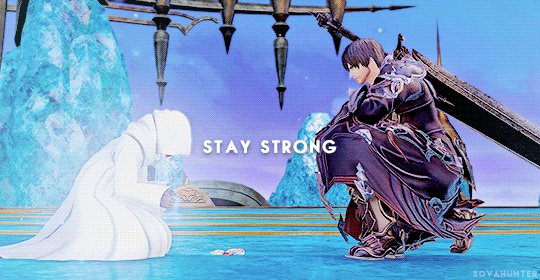

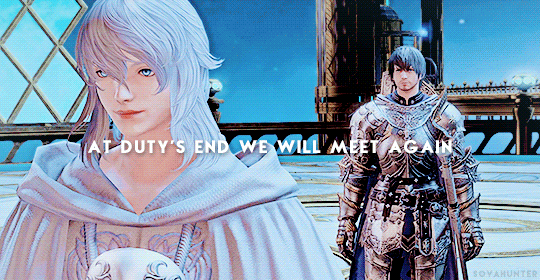
We will. We will.

#final fantasy xiv#meteor survivor#themis#elidibus#endwalker#shadowbringers#ffxivedit#gamingedit#videogameedit#6.4 spoilers#pandaemonium spoilers#otp: my guiding star#i've been waiting for this since 5.2 :')#my heart still hurts and i'm denying the plot again#yoshi-p please take away your catboy and give me one (1) alive ancient man instead
2K notes
·
View notes
Text
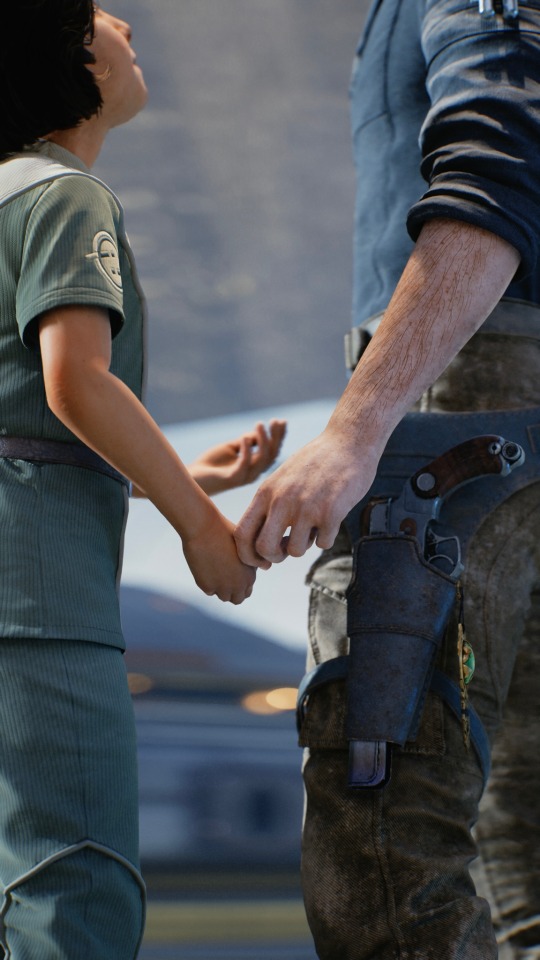
What Comes Next | Jedi Survivor
#“guide her through the darkness” guide ME through the darkness#so many thoughts about Jedi 3#star wars jedi survivor#jedi survivor#jedi survivor spoilers#cal kestis#kata akuna#photomode
204 notes
·
View notes
Text
I really do like the idea of the survivors having to fend for themselves instead of just immediately being saved. Like, let them get grimy and eat shitty meals cus the world's gone to hell and none of them have enough of the skills to know exactly what their doing. Would let the gang bond together which is always a treat. Thus, these silly drawings!

The others are very much done with his shit.

He eventually yields though because he doesn't ACTUALLY wanna starve.

#danganronpa#danganronpa art#danganronpa fanart#thh survivors#danganronpa makoto#makoto naegi#danganronpa byakuya#byakuya togami#danganronpa kyoko#kyoko kirigiri#danganronpa aoi#aoi asahina#danganronpa yasuhiro#yasuhiro hagakure#danganronpa toko#genocider syo#The Survivor's Guide#yay! i finally updated an au of mine#just took me several months O_O#also adding this in. i like to believe byakuya's not fond of mushy foods. he just doesn't vibe with them. along with many other things#what can i say! he's a picky bastard even in a lowkey apocalypse where the food is sparce and they're all trying their best#not that he's the only complainer. makoto probably misses his precious ramen and aoi's still internally mourning her dounts
84 notes
·
View notes
Text
Foxx Nolte's "Hidden History of Walt Disney World"

NEXT SATURDAY (July 20), I'm appearing in CHICAGO at Exile in Bookville.

No one writes about Disney theme parks like Foxx Nolte; no one rises above the trivia and goes beyond the mere sleuthing of historical facts, no one nails the essence of what makes these parks work – and fail.
I first encountered Nolte through her blog, Passport to Dreams Old and New, where her writing transformed the way I viewed the project of these giant, elaborate built environments. It was through articles like this one – about the sightlines from bathrooms! – that I came to truly understand what design criticism means:
https://passport2dreams.blogspot.com/2012/11/the-awkward-transitions-of-disneyland.html
While her work on queue design transformed how I thought about waiting, scarce-goods allocation, and the psychology of anticipation and desire:
https://passport2dreams.blogspot.com/2010/12/third-queue.html
But I really knew her for a kindred spirit when I read her masterful analysis of the historical context and enduring power of the Haunted Mansion:
https://passport2dreams.blogspot.com/2010/05/history-and-haunted-mansion.html
A decade after that Haunted Mansion post, Nolte published the definitive history of the Haunted Mansions, Boundless Realm, the very best book ever written on the subject:
https://pluralistic.net/2020/11/09/boundless-realm/#fuxxfur
This year, Nolte came back with another short, smart, endlessly fascinating history of Disney World, Hidden History of Walt Disney World:
https://www.arcadiapublishing.com/products/9781467156189
There are many histories of Walt Disney World, but none are quite like this. Nolte – who worked at the park for many years – combines her insider's view with her deep historical knowledge and yields up a "hidden history" that will forever change how I look at the built environment and the natural landscape it sits atop.
The path to Walt Disney World – an entertainment juggernaut that occupies a landmass twice the size of Manhattan – was anything but smooth. Its original design – Walt's design – barely survived groundbreaking, dying with Walt himself. Walt's successor, his brother Roy, used the occasion of Walt's death to assert his long-contested dominance over the park, drastically scaling back Walt's ambition for a bizarre residential/utopian community and replacing it with a kind of deluxe Disneyland with the idea of limiting the company's financial risk by re-creating a pre-existing, sure thing money-maker.
But Roy died within a few years of Walt, and the company transitioned from a family business to a managerial one, its direction set by executives who weren't named "Disney." These managers were just as flawed as the Disney brothers, but in much different ways (one long-serving CEO insisted that Disney should stay out of the hotel business, leaving billions on the table for contractors and third parties.
Of course, all of this is happening in Florida, and many of Nolte's funniest, juciest stories play Walt, then Roy, then various CEOs and execs off of flamboyant locals straight out of a Carl Hiaasen novel. In Nolte's capable hands, the many acres of Disney property come alive with the ghosts of Florida eccentrics and conmen who play against the deeply weird Disney brothers and their baffled corporate successors.
The history of Walt Disney World is also a history of the American narrative from the 1960s to the turn of the millennium, especially once Epcot enters the picture and Disney sets out to market itself as a futuristic mirror to America and the world. There's a doomed plan to lead the nation in the provision of an airport for the largely hypothetical short runway aircraft that never materialized, the Disney company's love-hate affair with Florida's orange growers, and the geopolitics of installing a permanent World's Fair, just as World's Fairs were disappearing from the world stage.
With Disney in disarray, corporate raiders smelled blood, and the company found itself on the brink of leveraged buyout hell, triggering another change in corporate leadership with the arrival of Michael Eisner. Nolte's portrait of Eisner is far more nuanced than the presentation in rival histories, surfacing his many forgotten gaffes – but also giving him credit where it was due. When the dust settles on the Eisner era, Disney has more theme parks in one place than can possibly be justified – in an America where workers get almost no paid vacation days, building more theme parks does not extend visitors' stays. It only adds to the expense of keeping those guests entertained during those brief, flitting visits.
The Disney empire is rooted in contradictions. The Disney brothers cordially loathed one another and the company split into "Walt people" and "Roy people" who schemed against one another in secret and sometimes even erupted into open conflict. There's something Hegelian about the Walt/Roy split: Walt went bust trying to run a creative empire that ignored the financials, and fled the ashes of his first venture to work with Roy in California. Roy disciplined Walt with financial rigor, often to excess. When the company emerged from WWII with its outside shareholders in charge, Roy became their champion and Walt's tormentor, with the ability to exercise a firm veto when he couldn't win the day through moral suasion.
Walt sought escape from his brother, proposing a series of ill-starred ventures that eventually became Disneyland. First, he proposed that he would transform his backyard ride 'em train-set into a public attraction that he would personally oversee, so that he wouldn't have to go to the office and let his brother boss him around. Then he proposed buying a locomotive and fitting out a train of railcars with exhibits promoting Disney movies, which he, personally, would drive around America, far from his brother.
Finally, he hit on Disneyland, poaching the company's best animators for a separate firm that Roy was eventually forced to buy from Walt in order to bring it back into the corporate fold. These power struggles, in which Roy first took orders from Walt, before turning the tables, only to have them turned again, culminated in the uneasy detente that characterized the era from Disneyland's opening to Walt's death.
Working with his brother may have made Walt miserable, but he evidently saw the benefit in this Hegelian dialectic, because he became infamous for putting together creative teams who were forever at each other's throats. The storied Sherman Brothers – Disney's star songwriting team – barely tolerated each other. The titans of early Imagineering were often at odds, and Walt took seemingly sadistic glee in forcing artists who disliked one another to work on joint projects.
In focusing on the conflicts between different corporate managers, outside suppliers, and the gloriously flamboyant weirdos of Florida, Nolte's history of Disney World transcends amusing anaecdotes and tittle-tattle – rather, it illustrates how the creative sparks thrown off by people smashing into each other sometimes created towering blazes of glory that burn to this day.

Support me this summer on the Clarion Write-A-Thon and help raise money for the Clarion Science Fiction and Fantasy Writers' Workshop!

If you'd like an essay-formatted version of this post to read or share, here's a link to it on pluralistic.net, my surveillance-free, ad-free, tracker-free blog:
https://pluralistic.net/2024/07/15/disnefried/#dialectics
#pluralistic#disney#walt disney world#secret histories#books#reviews#florida#survivor bias#gift guide#foxxfur#foxx nolte#passport to dreams old and new
117 notes
·
View notes
Text
Survival tip #88: Having someone with too much experience on your side ruins the vibe of the haunted house and doesn't let you have as much personal growth. That's why I abandon people after knowing them for a few hours. And maybe I do a liiiittle sabotage.
#duskmourn#magic the gathering#duskmourn survival guide#plus some of these survivors i just straight up do not like
40 notes
·
View notes
Text
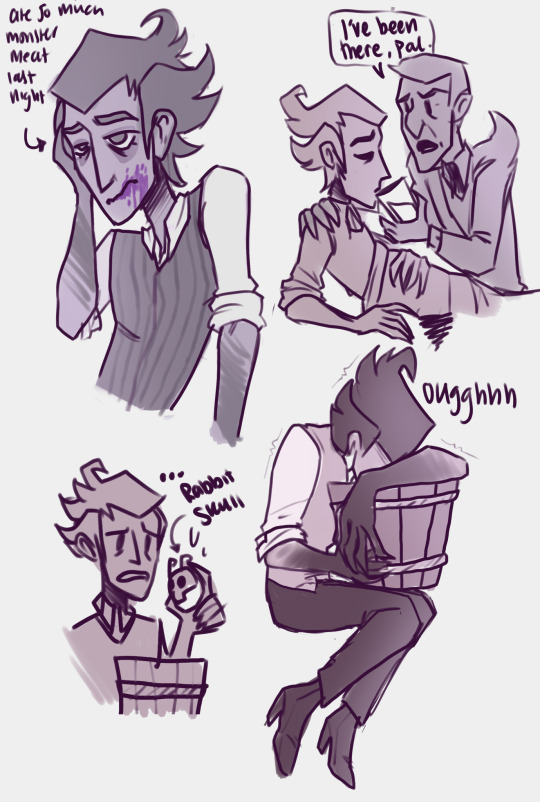
i had a bad tummyache so i projected onto him to make myself feel better
after being king hound for a night i imagine he’s pretty sick for the entire next day considering how much he ate and also that a lot of it was either inedible or would just make him real sick </3 poor dude needs a ginger ale or something
#king hound wilson#doodle tag#emeto tw#also max takes care of him the first few times because he knows what its like#i imagine the time between them meeting again during cyclum and them building the portal is when this happens#when they were still alone#and i think before wilson was booted off the throne where max was alone as a survivor was when he got used to his own monster form#so by the time wils comes around he’s gotten a handle on it and can guide him a little bit#dst wilson
87 notes
·
View notes
Note
i’ve been looking forward to zandvoort every year since they put it back on the calendar but man… man. i only feel ill
I feel great homie we already established rb20 upgrades flopped max IS fully unmedicated about to put rbr on 1 grand prix contracts senna style, McLaren are literally being run like an industrial complex puppy mill , merc finally hitting slightly above average marks, ferrari celebrating being closer to rbr than they were last year while rbr are literal VICTIMS of McLaren development . we have officially entered all timer endgame .. strap the f in, its gonna be fucking AWFUL u will cry every day. Every day. 6 death threats on Max’s name by fp2. This is formula uno. Good luck
#ask#shud I do a 2021 survivors guide for 2024#for max fans#because ik teamlh will come into my house and kill me if I even attempt to position myself anywhere near their . encampment#shud I do that#press like and subscribe#off season#spa gp 2024
23 notes
·
View notes
Note
How does booping work here?
(Genuine question)
booping is basically just a fun lil thing that gets everyone interacting/spamming the absolute hell out of with cat paws ranging from normal, super, evil and revenge boops (the last three have special mechanics to enable them !! super boop = holding the paw icon for one shake and letting go, evil boop = two/three shakes, and revenge = an option given if someone does an evil boop to u)
to enable it u will have a little punpkin-like game console called the B00p-o-meter at the top of ur dashboard !! it gives u the option to “start” or “opt out”, and start will allow u to boop + others to boop u :)
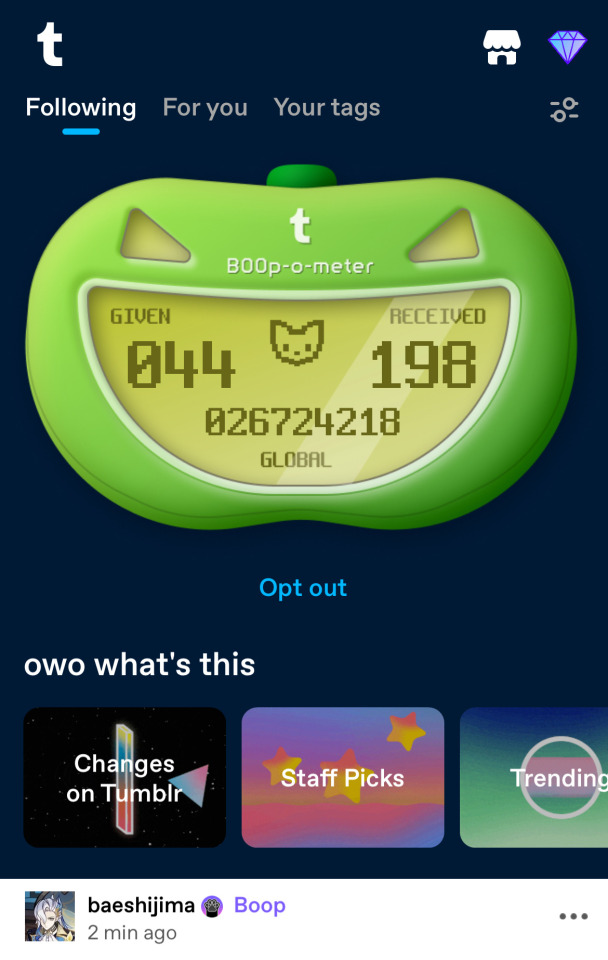
once u start, blogs that have also allowed the booping will have a “boop” option beside their url !! but if u want to do the super and evil boops, then u can go to that persons blog and there will be a circuluar cat paw in the bottom right that allows u to do all the other mechanics ^^
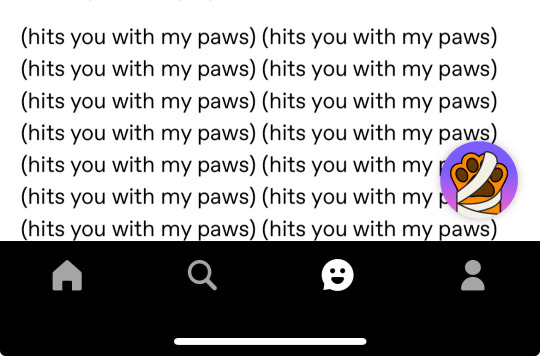
#omg a convo !?#not sure if this is what u meant so i jelust went for a full on guide as a survivor of the 2024 april fools booping fest 🫡#maybe those who didnt get the badges can get them this time then since there are no new ones??#for those u just have to spam boop a lot…. i mean a LOT#the easiest way is probs just spam booping urself for the badges 😭
18 notes
·
View notes
Text



Doodle Scugs 💚
#rain world#rainworld#rain world hunter#rain world survivor#rain world monk#my art#fanart#I'VE BEEN SITTING ON THIS FOREVER GOD#Anyway these are just lil doodle designs when I feel like drawing simpler scug hehe#I'm still working on my overall slugcat anatomy guide for myself#But for now I'll treat myself to the simple things
63 notes
·
View notes
Text

“Focus on me.” A companion piece for @voidcat-senket's fic in which Kylo gets a shave and Rick gets a panic attack. Made for a total audience of like. Us.
#kylo ren#matt the radar technician#rick the door technician#sposha violation#technishipping#part of a sentinel guide au we've been working on#my art#star wars#star wars jedi survivor#jedi survivor#star wars sequel trilogy
26 notes
·
View notes
Note
How should you write/draw burn survivors? I know this isn't a drawing blog but I don't know of one that I could ask this question to.
Hello!
I'm not a burn survivor myself, so I'll mostly talk about facial differences/visible disability in general and link some stuff made by burn survivors.
First thing, I think it's important to remember that being a burn survivor changes a lot of things - not only appearance. Very important part is the psychological one, but I'm not a burn survivor so I will just let the resources linked below speak.
From the physical aspect, burns can also come with: chronic pain, limited range of motion due to scarring, tightened skin, problems with regulating temperature, itching, skin irritation, and even different nutritional needs during the initial healing process.
There is also specific everyday care associated with burns - something you basically never see in fiction. That could be things like occupational therapy, physical therapy, skincare (like heavy moisturizing and scar massaging), wearing sunblock, wearing splints, or stretching to prevent contractures or tightness.
There are also different types of burns and they (unsurprisingly) differ from each other - for example, electrical burns have a much higher rate of amputation than any other type. Chemical burns can cause eye issues. A burn caused by a fire in a closed space might result in a brain injury due to the lack of oxygen. A much larger portion of people than you (probably) assume have survived burn injuries as small children, and if they were young enough they might not even remember the event at all, unlike older people who might be very affected by the trauma.
Experiences of a person with 80% body surface burns, a person with quadruple amputations from an electrical burn, a person with a facial burn, and a person burnt very recently will be different from someone who has a 5% body surface 2nd degree burn in a spot that’s usually hidden, who has lived with their burn for a decade - despite them all being burn survivors.
When it comes to more thorough research, I recommend going through Phoenix Society’s and Face Equality International’s websites to learn more about both real burn survivor’s perspectives, and face equality as a social justice topic. I think the 3rd link (see below) puts it very well when talking about burn survivors being represented in fiction:
“Most likely, these characters were not created by someone with lived experience. The result is an increasingly garbled game of telephone [...] To avoid contributing to this false narrative, embrace research as part of the process. Explore interviews, first-person accounts, and articles from reliable sources.”
I personally think that the links below should be mandatory reading for writing not only burn survivors, not only people with facial differences, but visibly disabled people in general - because the treatment we get is often so similar the advice still holds up just fine. And if you don't plan on writing any of these, you should still read them to see how prevalent of a problem ableism in media is.
Lise Deguire's Hey Hollywood - scars don't make you evil.
Face Equality International's International Media Standard on Disfigurement.
Niki Averton's Tips for Writing about Burn Survivors.
The main sentiment that you will read from basically any first-hand source is that if you're writing the burn survivor to be either:
evil (just throw the whole character away. please.)
a guy with the "World's Saddest Most Tragic Backstory Ever and It's So Sad and Tragic" (because he revealed he has a scar.)
a helpless victim who is there to be The Helpless Victim
...then you're already doing it wrong and need to make some major changes.
From our blog's reblogs and posts, you might want to look at tips for writing a visibly different/disabled character and tips on drawing people with facial differences. Neither are specific to burn survivors but cover the topic of visible disability and facial differences.
Now for tips on drawing burn survivors (that weren't included in the last link);
Reference real people. 99.9% drawings of burn survivors seem to go through the same "increasingly garbled game of telephone" that Niki Averton mentions with how burn survivors are written, in that the newer the drawing, the less in common it has with how real people with burns look like because people reference from each other and none of them ever think to actually check if their depiction is accurate. If you just google "burn survivor" you will very quickly notice that burn survivors don't have that damn red overlay layer put on top of their skin. It just doesn't look like that, and basic research (aka Google Images search) will tell you that - and still, people color a hand with bright red and think that's how it looks like (it doesn't).
In the same vein, maybe don't just draw an able-bodied person and then put some scarring on top (or maybe do exactly that. No burn scar and no burn survivor is the same, and there are people that fit what I just described... but hear me out for a second). Think about how scars interact with their features - do they have both of their ears? Do they still have all of their hair? Do they only have parts of their eyebrow? Do they have all of their fingers? Can they move the same as before their burn, or are their scars limiting their joints? How did their body react to the post-burn hypermetabolism? Lots to think about. Take into account what type and thickness of burns your character has.
Ditch the mask trope. Just ditch it. There's no need to cover your character's scar from the world unless you as the author think it requires to be hidden, is too scary to show, or other ableist trope that seems to always come up with drawings of visibly disabled people, especially burn survivors. The one exception I will mention is a transparent face orthosis/mask (TFO) that facial burn survivors might wear while awaiting a skin graft early after their injury. But as the name suggests, it's transparent and doesn't work for the awful "ohh scary facial difference better cover it up and only reveal it in some hyper dramatic scene!!" trope because you can see right through it. (I will also mention that TFOs are a very modern thing. Your medieval burn survivor wouldn't be wearing one.)
No "body horror", no "gore" tags or trigger warnings or whatever. That's a human being. If you feel the need to warn your followers before they see a disabled person existing, you're better off not drawing them.
Some last notes;
Throughout this ask I used the term "burn survivor" rather than "burn victim" because that is, to my knowledge, the general community preferred phrase. Individual opinions will differ (because no group is a monolith) but "burn survivor" is generally the safest term to use and probably the best if talking about a fictional character.
Similarly, I used "facial difference" rather than "disfigurement". Just as the above, opinions will differ on what is the best to use but I personally, as someone with facial asymmetry and a cranial nerve disorder, heavily prefer the term "facial difference" over "disfigurement". (I am in this case The Individual Opinion Differing because you can notice that in the links above, facial difference and disfigurement are used interchangeably. The general community uses both, some people have specific preferences. I'm some people.) When talking about a fictional character, "facial difference", "visible difference" and "disfigurement" are all probably fine. Just stay away from calling a person "deformed".
mod Sasza
#anonymous#mod sasza#face difference#writing advice#writeblr#writing disabled characters#writing tips#writing resources#writing guide#art reference#burn survivor representation
1K notes
·
View notes
Text


thinking about naive and decent Deputy "big fan of Steve Buscemi" Thornton and sarcastic sleepy Deputy "former athlete" Mulligan again
#deputy thornton#deputy mulligan#alan wake 2010#alan wake#from the Official Survivors Guide from Alan Wake 1#i cant believe i had to get the game guide from 2010#for the real juicy lore#but here i am on my character deep dives again#i too am a big fan of steve buscemi#also me and autumn had mental breakdowns about how buscemi is clearly an influence on thornton's design
9 notes
·
View notes
Text
Unhoused Solidarity In Action
This is a non-exhaustive list of resources you might have access to, or know of, that can be used to aid unhoused community members directly. Many of these focus on direct mutual aid as individuals but can be helpful to consider when in community organizing settings. - What do you (or someone you know) have access to, that you can provide to the community? - Can they be accessed, used, or provided: regularly, occasionally, only in emergencies, weekly, daily, sporadically, consistently, etc.? - Consider seasonal needs (winter coats don’t help us when it’s 90 degrees out!) - Remember to practice active, informed consent with individuals and ask if these would be helpful! Don’t take it personally if your offer isn’t helpful to someone, it might help someone else. - These should be realistic and not compromise your safety or well-being. Remember to prioritize safety over comfort.
Housing
- Consider your relationship with this person (generally, don’t offer complete strangers into your home)
- Location matters a lot. Unhoused people often need to be near “hubs”/cities, close to resources and systems of care.
- Some people can’t live in hotels, couch surf, or any of these options without losing their housing vouchers, and in some cases health insurance or other assistance programs. Legal definitions of homelessness (used by voucher programs) usually don’t include people living in hotels/motels, or couch surfing (including most of these options). Check with the individual to see if this might be helpful.
Extra bedrooms
Campers, trailers
Couches
Apartments
Land/yards to camp on, park at, etc.
Donate funds or points for a hotel room
Shelters
Floor space
Safe parking lots to sleep in your car in (sleeping in your car is considered legal homelessness in most places)
Time
- Emotional capacity and minimizing the risk of burnout are important here especially
Do outreach with a community org
File for grants
Provide education materials
Share knowledge regarding resources
Emotional support - build genuine connections with your local unhoused neighbors
Reach out to companies for donations
Create or add to lists of resources, open bathrooms, etc.
Transportation
- One of the biggest barriers to accessing existing resources is transportation (also mailing addresses, internet access, and active phone service)
Personal car, ride-sharing/carpooling
Bus tickets/passes
Old/not frequently used bikes
Taxi services/vouchers
Uber/Lift gift cards
Carpooling
Coordinate rides for people
Food
- A lot of unhoused people prefer “comfort foods” to “health foods” - Ask about dietary restrictions, the cooking ability of the unhoused person, the cooking equipment, etc. - Soft foods are frequently more accessible to us as dental issues are very common - 100$ in fast food is significantly less than 100$ in homemade food
Can cook hot meals
Can pay for meals
Knows someone (person, business) who can supply food
Inviting people over for a meal
Gifting food (be sure to be considerate of dietary restrictions, cooking ability, equipment needed to cook, etc.)
Have a community dunkin gift card
Make or add to a fruit tree map (fallingfruit.org, community gardens, federal university campuses)
Money
- Money should be freely given, with no strings attached - Ask what form works best for them— cash apps/virtual, physical cash, gift cards, quarters, etc.
It is best to provide cash donations directly to impacted individuals (or organizations) with no strings attached
Provide relevant, local chain store gift cards (Grocery stores, coffee shops, restaurants)
Coordinate fundraisers
Apply for grants
Supplies
- Ask individuals what they need most!
Purchase and donate supplies directly to individuals or organizations
Reach out to businesses
Donate old phones or computers
Add someone to your family phone plan
Donate professional clothes for interviews
Donate an outfit you would actually wear
Talents, Trades, Skills
Your hobbies might be helpful! Crochet is extremely trendy right now (easy to learn, you could make hats/scarves for community members)!
Professional ties/experience Examples: You’re a cosmetologist who can do free haircuts for an hour each week, or you’re a graphic designer who can create a website for an organization for free, or you’re a nurse who can provide wound care to encampments
Community gardens
Connect with and partner with non-profits or community-based organizations in your area (or help start one if there’s none!)
Allow people to use you as a reference for job interviews
Bathrooms
- Not just toilets, but showers and mirrors are important too
Ask businesses to pledge to have open, public, accessible, and free restrooms
Your personal restroom
Make a list of local public restrooms
Free gym memberships or add someone to a gym plan
Services
- In order to access most services, you need most, if not all, of the following: transportation, identification, important paperwork, printing/faxing access, mailing addresses, internet access, active phone service, free time during business hours, and emotional and mental ability (and capacity) to complete everything required (forms, applications, phone calls, interviews, annual reviews, verifications) in a timely manner (usually on a strict deadline)
Case management experience you can volunteer
Peer support for service navigation (great option for people with prior lived experience)
Advocacy within services
Offer to provide a P.O. box or use your address to receive mail
Housing skills
Allow someone to use your library card for books, computers, the internet, etc. (most libraries won’t allow unhoused people to get a library card)
Volunteer at a shelter
Allow someone to use your home wifi, printer, phone number, mailbox, email, etc.
Fundraising
- If you can’t donate your own personal funds, fundraising is a great way to help out
Community mutual aid asks (in person or online)
Art walks
Skate competition
Concerts
Tip jar
Gift basket raffle
Clothing and food drive
Game tourney
Live streams
Start a GoFundMe for individuals/orgs
I strongly encourage you to look over the matching slides I created for this workshop: https://docs.google.com/presentation/d/1VDngImsMByUFmKX611zAJ43a0UcYIfMBxrbh_g1IJvc/edit
As a disclaimer: I have been homeless/unhoused for over half of my life. My experiences of homelessness have included while being a infant, toddler, young child, preteen, teenager, and young adult. I am 24 years old. My most recent experience of being unhoused was last year, and I am currently precariously housed (meaning: at high risk of losing housing again). My experiences of homelessness have included sleeping outside in a tent, sleeping on park benches and under freeways, walking around all night to avoid hypothermia and freezing to death (something that has happened to several of my friends), couch surfing, sleeping in cars, squatting, sleeping in motels, living in a shelter, and institutionalized. I have been homeless with family a few times during early childhood and again when I was 15. All of my other experiences of homelessness have been on my own starting at age 9 or 10, and the last time I lived with a parent I was 16. I have been homeless in both rural and urban areas. I have been homeless in New England/Northeast United States as well as the Pacific Northwest.
In addition to this, I have many contributing factors to my experience, including being disabled, a person of color, trans, queer, a survivor of child abuse and CSA, being trafficked, and a drug user and a SWer, amongst other marginalized experiences.
That being said: my experience of being unhoused/homeless is not the universal experience. While I know many people of all different demographics who I’ve met on the streets, I cannot speak to every single person’s experiences. I especially cannot speak to experiences outside of the United States, aside from what I hear secondhand.
This is meant to serve as a general guide to accompany a workshop I created, and might not be helpful for everyone. If it’s not helpful, I hope it inspires others to offer creative solutions. I’m always working on expanding this list. Thank you for reading.
#chronically couchbound#guides#info#homelessness#unhoused#homeless#houseless#homeless care packs#mutual aid#community organizing#community outreach#houselessness#homeless trans youth#support swers#trauma survivor#houseism#housing instability#affordable housing#housing crisis#support unhoused people#support homeless people#disability#disabled#intersectional social justice#intersectionality#praxis#leftist praxis#solidarity#trans solidarity#queer solidarity
64 notes
·
View notes
Text
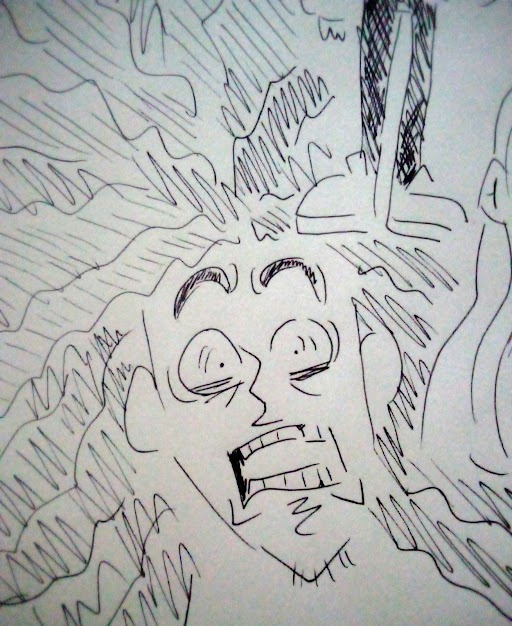
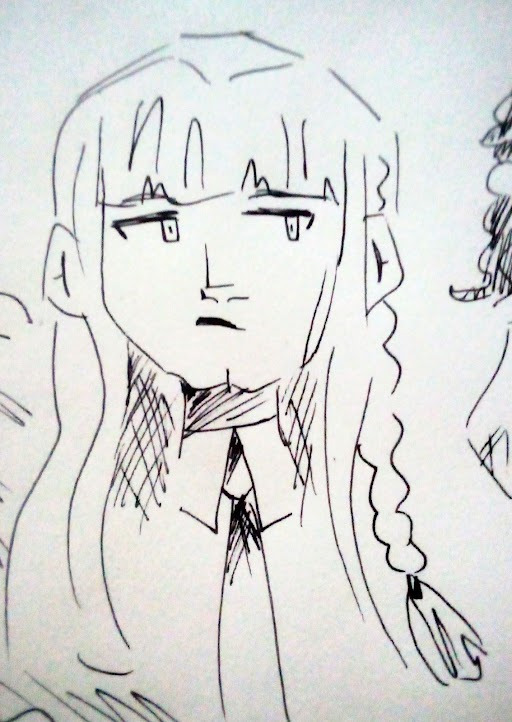
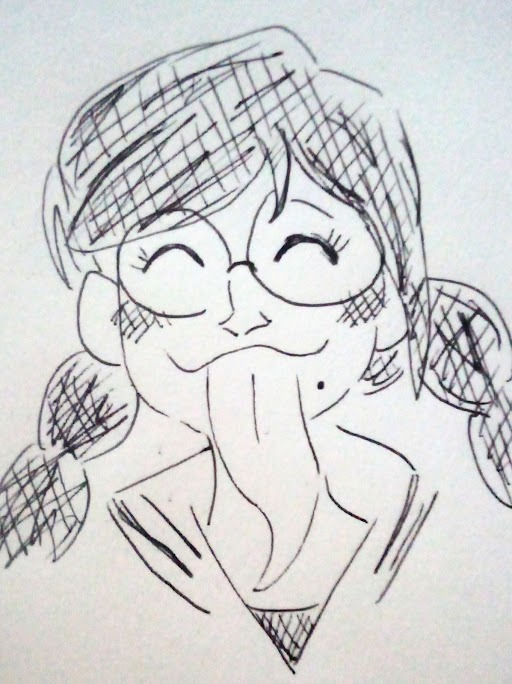
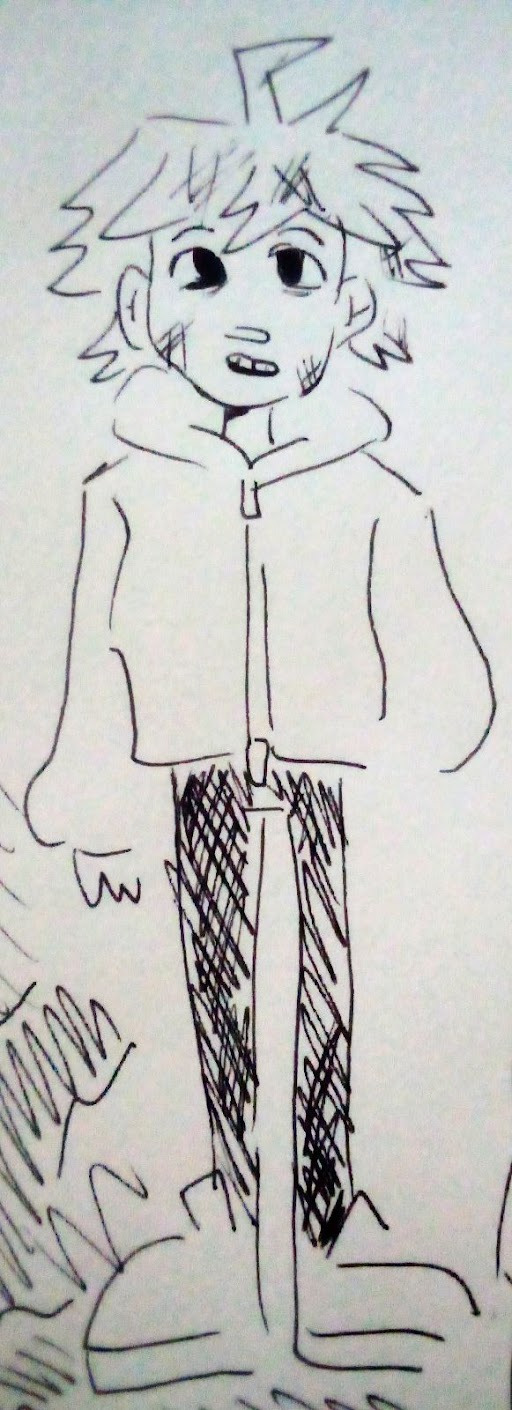

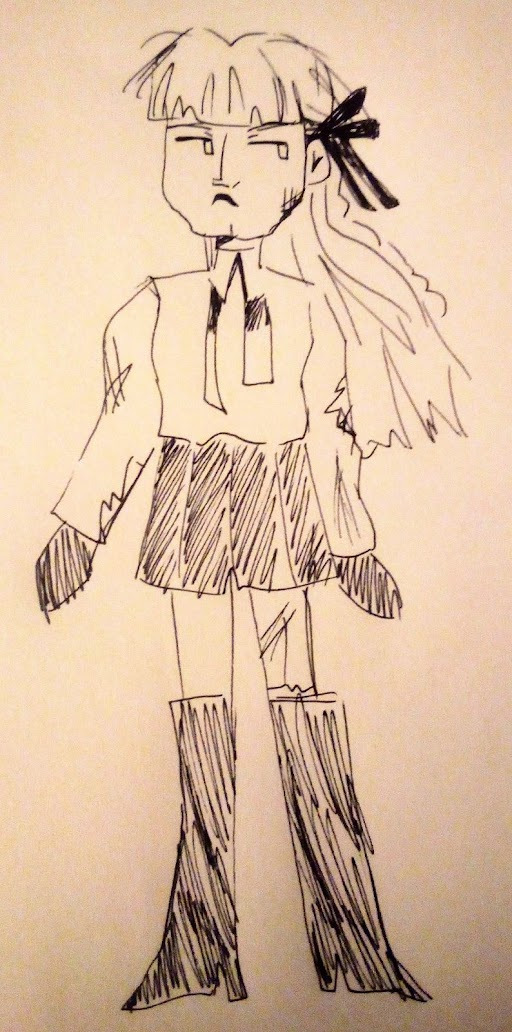

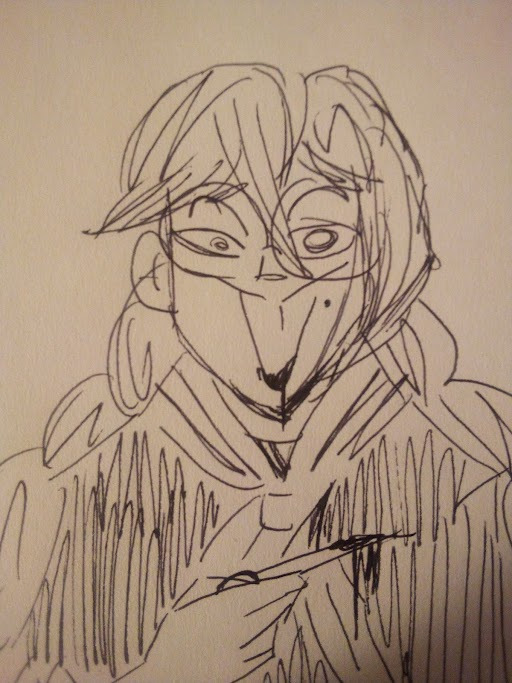




Just a cluster of pics with the survivors with some sudo-content for The Survivor's Guide.
#danganronpa#danganronpa art#danganronpa fanart#danganronpa au#The Survivor's Guide#danganronpa makoto#makoto naegi#danganronpa kyoko#kyoko kirigiri#danganronpa byakuya#byakuya togami#danganronpa aoi#aoi asahina#danganronpa toko#toko fukawa#genocide jack#genocide jill#genocider syo#danganronpa yasuhiro#yasuhiro hagakure
69 notes
·
View notes
Note
CSA survivor here about the post on censorship- I just want you to know that no survivor is perfect and that sometimes their message may not be what you expect. The line for what glorification is lies in a different place person to person. To limit how we express ourselves would be silencing us. If I wrote about my abuse and then fictionalize it then how I chose to write it would be read differently by every person who choses to interact with it. There are people still think Lolita glorifies pedophillia but many people have said that it was through that book they recognized what happened to them. Policing language makes victims less likely to come forward and less likely to connect with others like us.
None of this is meant to be chiding btw. I just figured you the type to actually want to learn and understand and felt you could use someone giving you benefit of the doubt.
I know anon sent this ask to me by mistake (they sent a follow up saying they’d clicked the wrong account by mistake on a post with several reblogs, and meant to send it to someone else), but I think what you’re saying here is important and wanted to post it (hope that’s OK).
I have fictionalized my own abusive experiences into fiction, along with my struggle with mental illness, most prominently in my OW In/Exhale. I wrestled a lot with how dark and real to make it and finally took the plunge. I lost some readers who felt it was “too much,” but I had several others mention how much the story had helped them.
For some, it made them realize they’d been abused. Others were able to find the strength to seek help. Others found the story alone helped them.
I have to say being told that was a giant reason I kept sharing that work and others that also delve deep. Because they help me and obviously sharing them can help others as well.
I completely agree with your point also that by silencing (or attempting to) stories about abuse, even if you’re focusing on “fiction,” means survivors are silenced as well. I won’t ever forget how tumblr banned people for writing about their own abusive experiences. 😡
When you ban that topic, it means even for educational reasons you can’t discuss it. And abuse thrives on silence. If we don’t talk about it, if we don’t tell and warn people how to spot it and extricate yourself from it, then it will only be more pervasive.
Ironic that pro-censorship folk think by fiction with abusive topics existing, you’ll create more abusers when in fact the reverse is true. If people can’t recognize abuse, it’s far easier to be abused.
It’s true that for some people reading or writing about their experiences can make them even worse—i know i have a citation on that in another post on the topic somewhere—but the wonderful thing about fiction is you can always close the book, turn off the TV, and walk away.
#poi answers#anon#anti censorship#not kuro#ask was sent in error to me but it’s a good topic imo#it’s part of why i am so angry at pinterest#they banned so much mental health stuff even helpful guides#bc they’re so worried about being sued i guess#mental illness#pro survivor
14 notes
·
View notes